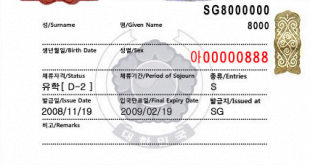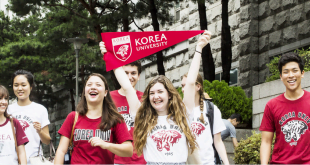Learning a new language can be an exciting and rewarding experience. And what better way to immerse yourself in it than by learning it where it is spoken natively? If you’ve ever considered learning Korean, South Korea offers a unique and enriching environment to embark on your language learning journey. In this article, we will explore the reasons why South Korea is an excellent destination to learn the Korean language. We’ll see as well the top language schools to consider, cultural experiences, and essential tips for a fulfilling and rewarding learning adventure.
Table of Contents
Why Studying Korean in South Korea?
Learning Korean in South Korea offers an unmatched experience, enhancing not only your language skills but also providing insights into the vibrant Korean culture. By being surrounded by native speakers, you get ample opportunities to practice, improving your listening and speaking abilities.
Moreover, understanding the local language allows you to connect with locals on a deeper level, fostering meaningful friendships and cultural exchange. Here are some of the main advantages of going to South Korea to learn Korean:
Immersive Environment
Being in a country where Korean is the primary language means you’ll be surrounded by it every day. This immersion accelerates your language learning process as you constantly hear and see the language in real-life situations.
Authentic Pronunciation
Interacting with native speakers gives you the opportunity to pick up authentic pronunciation, intonation, and colloquial expressions. This is challenging to replicate in a classroom setting abroad.
Cultural Understanding
Language and culture are deeply intertwined. By studying in South Korea, you’ll gain insights into the Korean customs, traditions, and social norms. What’s more: this will help you better understand the language’s nuances and context.
Opportunities for Practice
You can practice Korean with locals in various settings, like markets, cafés, and public transportation. Engaging in daily conversations enhances your speaking and listening skills.
Language Exchange
Many South Koreans are interested in language exchange, where you can teach them your native language in return for Korean lessons. And that’s another great way to practice and make friends at the same time.
Numerous Language Programs Available
South Korea offers numerous language schools and programs tailored for international learners, ranging from short-term courses to comprehensive language studies.
Job Opportunities
If you plan to work or study in South Korea, learning the language is essential. Not only, this will improve your employability but also will open doors to various job opportunities.
Travel Convenience
Navigating the country becomes more manageable when you can read signs, ask for directions, and communicate with locals. Learning the local language therefore enhances your overall travel experience.
Personal Growth
Living abroad challenges you to adapt to a new environment. And by extension, it helps fostering personal growth, independence, and cross-cultural communication skills.
Networking and Socializing Opportunities
Learning the local language allows you to connect more easily with people. You can therefore foster meaningful friendships and expanding your social circle along the way.
While learning Korean in South Korea has numerous advantages, keep in mind that language acquisition also depends on your dedication, consistency, and willingness to practice both inside and outside the classroom. So, any time you have the opportunity, it’s a fantastic experience that can significantly enhance your language skills and cultural understanding.
Where can I learn Korean in South Korea?
If you’re interested in learning Korean and studying the Korean culture in South Korea, there are several options available. South Korea is known for its excellent language programs paired with cultural experiences. Here are some suggestions on where to learn Korean and immerse yourself in the Korean culture:
Universities and Language Institutes
Many universities and language institutes in South Korea offer language courses for international students. You can consider enrolling in institutions such as Seoul National University, Yonsei University, Korea University, Sogang University, or the Korean Language Institute at Ewha Womans University. These places often have structured language programs for all proficiency levels, including beginners.
Read here our ranking of the top universities in South Korea.
Online Korean Courses
Even if you’re already in South Korea but have a busy schedule, preventing you from getting the time to learn the language, there is always the remote option. That’s where institutions such as the Dongguk University’s International Language Institute have extended their course offering with an online Korean language course. The purpose is to reach Korean language learners not only in Korea but also throughout the world.
Private Language Schools
There are private language schools throughout South Korea that cater specifically to international students. These schools may offer more flexible schedules and shorter-term courses compared to universities. The only setback is that this option tend to be more costly than the others.
Language Exchange Meetups
Once you’re in South Korea, you can attend language exchange meetups where you can practice your Korean with native speakers and, in turn, help them practice their English. Websites like Meetup.com as well as language exchange apps can help you find such events.
Cultural Experience Programs
Many organizations and tourist centers offer cultural experience programs that allow you to learn about Korean traditions, arts, and cuisine. These programs often include language lessons alongside cultural activities. This however may not be the best option if you seek to be fluent in the language as the experience is limited in time.
Homestay Programs
The last option to consider would be participating in a homestay program where you live with a Korean family. This will not only help you practice the language in a natural setting but also expose you to everyday Korean customs and traditions. However, you might need to have some basics of Korean to be able to participate in such programs.
Some of the Best Korean Language Schools in South Korea
When it comes to learning Korean in South Korea, choosing the right language school is crucial. Here are some of the top language schools that offer exceptional programs:
Seoul National University’s Korean Language Education Center
The Korean Language Education Center of SNU started to develop its Korean Language and Culture Program in 1969. The program’s purpose, since then, is to provide intensive language learning to foreign students of South Korea’s higher education institutions. The other goal of the program is to offer opportunities to others to learn about the Korean language and culture.
Since its implementation, the program had produced more than 28,000 graduates from more than 90 countries worldwide. Moreover, the language institute has managed to enroll about 3,000 per year. The KLCP, on the other hand, offers 3 course formats:
- Regular program of 10 weeks to which students can register after sitting a placement test to determine which level suits them best.
- Teacher training program which targets experts who are able to teach the Korean language at home and abroad. The aim is the internationalization of the Korean language and the improvement of the quality of Korean language teaching domestically and globally.
- Short-term program for those who want to learn Korean for a day-to-day use. This program doesn’t require any prior to enrolling at level one.
Korea University Korean Language Center (KU KLC)
Another Korean language school in Seoul, KU KLC is renowned for its immersive programs and experienced instructors. They offer courses tailored to different proficiency levels, ensuring a personalized learning experience.
Among the program formats, there are:
- Regular program with 4 semesters’ formats and 6 levels of proficiency and a top-level course for those who have finished the 6 first regular levels. This program aims at foreigners or overseas Korean high school graduates. At level 1, students learn the most basic Korean used for everyday life. At level 6, on the other hand, they are able to understand and express Korean in a wide variety of professional and academic settings.
- Online short-term program, as stated in its name is done via Zoom, with a maximum of 10 students per class. This format aims for candidates who already can read and write Korean.
- Short-term intensive program for adults who would like to learn the Korean language and culture for a short period. This format is for foreigners and Korean high school graduates abroad, with a minimum of 8 students per class.
- Youth summer school
- Customized programs
Yonsei University’s Korean Language Institute
Situated in the heart of Seoul, Yonsei University’s Language Institute (KLI) offers students an opportunity to learn the Korean language and culture while improving their knowledge of Korea. And since Yonsei University’s establishment in 1959, the institution has worked toward this goal. Since then, the institution has become one of the leaders in the field.
Through a 10-week course, the regular program format enables students to attend class 5 days a week, and 4 hours a day. Moreover, the program has 6 levels from beginner to advanced. Other course formats include an advanced program, evening program, special request program, summer special program and a 3-week program.
Lexis Korea
What makes Lexis stand out is its student population which consists of a various range of nationalities and not one that is predominantly Asian. This language school has 2 campuses in South Korea, one in Seoul and another in Busan. Another distinctive trait of Lexis is that the program mainly focuses on speaking and vocabulary, instead of on grammar, to be more useful in everyday life.
Moreover, students are given numerous opportunity to learn inside and outside classes, and using various course support such video clips or audio files. As for the study pace, students learn at a low-medium intensity (15h a week or 25h a week). This gives them enough time to master the material between classes. Lastly, Lexis runs biweekly “Meet Up” events enabling students to meet local Korean friends and study partners at a local café.
How much does it cost to learn the Korean language in Korea?
The cost of learning the Korean language in Korea can vary depending on several factors, such as the type of language program, the duration of the course, the location, and the institution or school you choose. Here are some common options and their approximate costs:
- University or Language Institute Programs at a university language institute, the fees can range from $1,300 to $1,500 per trimester, depending on the program’s intensity and the school’s location. For a 6-month course, expect to pay around $2,500 – $2,600 including textbooks. And these are prices for programs in Seoul, but in cities such as Busan or Daegu, prices can drop to $1,000 per trimester.
- Intensive Language Courses: with more hours of instruction per week may cost more but can help you progress faster. These courses can range from $1,500 to $6,000 per semester.
- Short-Term Courses: If you’re looking for a shorter course or a summer program, expect to pay around $1,000 to $2,500 for a few weeks of instruction.
- Private Tutoring: Private tutors offer more personalized attention, but their rates can vary. On average, private tutoring can cost anywhere from $20 to $50 per hour.
- Language Exchange Programs: Language exchange programs are often more affordable or even free, as they involve language learners from different countries coming together to practice each other’s languages.
Remember these are approximations. It’s essential to research and check with specific language schools or programs for the most up-to-date pricing information. Furthermore, there might be scholarship opportunities in South Korea available for international students studying Korean. All in all, it’s worth exploring those options to help reduce the overall cost of your language learning journey.
Essential Tips for Learning Korean in South Korea
To make the most of your language learning journey in South Korea, consider these helpful tips:
Choose the Right Korean Language School
Before embarking on your language journey, it’s essential to choose a reputable language school that caters to international students. Always do some research on the institutions to find out about their accreditation and if they have experienced teachers who can effectively guide you through your learning process. Moreover, consider factors such as class size, curriculum, extracurricular activities, and student support services.
Learn Beyond the Classroom
For that, you should engage with locals and fellow students to practice Korean through daily conversations. Moreover, immerse yourself in media: Korean movies, drama, and other shows that should help you get familiar with the diverse accents. Another way to do so is to participate in language exchange meetups, like the ones organized by Lexis. These meetups are very useful to meet locals interested in language and cultural exchange.
Balance Study and Leisure Time
While learning Korean is undoubtedly a priority, it’s essential to strike a balance between study and leisure time. Engaging in recreational activities and hobbies will help prevent burnout and allow you to enjoy the diverse entertainment options South Korea has to offer.
Overcome Language Learning Challenges
Learning any language comes with its challenges, but don’t be discouraged. Surround yourself with a supportive community, seek help from teachers, and practice regularly. Embrace the learning process, and you’ll see significant progress over time.
Exploring South Korea’s Culture and Heritage
Beyond language learning, South Korea’s rich cultural heritage is worth the discovery. Visit historical sites, museums, and traditional villages to gain an understanding of the country’s past and present. Engaging with cultural experiences will deepen your appreciation for the language and its significance in shaping the Korean identity. This includes:
Discovering the South Korean Cuisine
Food plays a significant role in any culture, including Korean, and trying out local delicacies is a must. From hearty stews to delectable street food, South Korea’s culinary offerings will delight your taste buds. Moreover, dining out provides excellent opportunities to practice your language skills in a relaxed and enjoyable setting.
Navigating the Cities and Transportation
South Korea boasts modern and efficient transportation systems, making it easy to travel within cities and explore the country. Familiarize yourself with public transportation, such as buses and subways, to navigate your way around. Exploring different regions will expose you to various accents and dialects, further enriching your language learning experience.
Getting Familiar with Safety and Etiquette in South Korea
South Korea is known for its safety and cleanliness. It’s therefore essential to familiarize yourself with local customs and etiquette to show respect for the culture. Understanding and adhering to social norms will help you integrate better into Korean society and create lasting connections with locals.
Embracing the K-Pop and Hallyu Wave
K-Pop has taken the world by storm. And being in South Korea will allow you to fully immerse yourself in this phenomenon. Attend live performances, visit entertainment agencies, and even consider taking K-Pop dance or singing classes. Embracing the Hallyu Wave firsthand will undoubtedly add a unique dimension to your language learning journey.
Conclusion
To sum everything up, learning Korean in South Korea can be a life-changing experience that offers not only language proficiency but also a deeper understanding of the nation’s rich heritage. So take any opportunity to immerse yourself not only in the language but also in the culture and traditions of South Korea. Trust me, you’ll gain some invaluable skills and make cherished memories! Therefore, pack your bags, embark to the adventure and let the beauty of Korean language and culture unfold before you!
This post is also available in fr_FR.




 Aljawaz Your guide to study abroad
Aljawaz Your guide to study abroad











It’s really good information for me and those people who take interest in spoken English or languages. Thank you very much for this amazing blog.